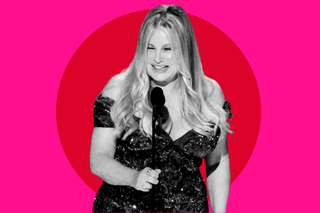
How Jennifer Coolidge Redefined the ‘MILF’ Character as Someone to Root For
The archetype is laden with dehumanizing cliches, but Coolidge’s persona lent it an air of intelligent comedy.

There’s something subversive about Jennifer Coolidge. Before her Emmy-winning performance in HBO’s White Lotus, Coolidge was most famously known as the “OG” MILF — as a character’s mom in American Pie. The MILF archetype predates Coolidge’s character and has endured for long after.
But she alone stood out for the way she didn’t quite fit, and in seeming misshapen, redefined the character entirely. While the character was one that was defined by a voyeuristic gaze before (and even after) hers, Coolidge lent it an air of humor and detached irony.
There’s a light irony, a knowing campiness with which Coolidge played that and all other parts since. And despite the derisiveness with which MILFs are regarded critically — dismissed for their one-dimensional femme fatale sex appeal and lascivious air crafted solely for the male gaze — her Emmy win last night was met with resounding cheer and celebration. It was, finally, her time. “I took a lavendar bath tonight…and it made me swell up inside my dress,” she said, before loopily dancing along to the song that played her off the stage, turning her acceptance speech into one of the most iconic ones of the night. Nobody can quite predict what she’s about to say or do, which makes everything feel like a bit you’re not sure is really a test of your own wit or not.
Her portrayal of the MILF, when seen against the actor’s persona itself, shows that she brought an element of agency to the character that others lacked. Not sexual agency — for that’s the MILF trademark — but the agency of knowing the pitying, derisive gaze with which MILFs are looked at. Coolidge played to that exact gaze making those who look question their own role in constructing the cliché in its many dehumanizing parts. In not taking herself very seriously, she lent an authenticity to a stereotype that was never meant to have any.
MILFs are necessarily lonely, vulnerable, sexually experienced, and above all, look like slightly more mature versions of their teen selves. Take Mrs. Robinson from The Graduate, who exists to further the plot of a young, existentially confused man — and compare it with Mrs. Stifler, who exists for her own sake. There was very little about Coolidge that checked all these boxes — and yet, her detached, DGAF aura lent the character itself an air of self-awareness that others lacked. Upon first glance, Stifler’s mom is a typical male fantasy vessel — but with Coolidge’s involvement, she became something else. There was a kookiness — a Coolidge hallmark — to her that added a layer of nonchalance that other characters in the category don’t have.
It’s with the benefit of hindsight, then, that looking back on one of her most famous characters before White Lotus shows how she subverted the archetype itself right under our very noses. Where MILFs are supposed to be empty, vacuous, and seductive to younger men, Stifler’s mom was all these and she knew it. It’s the kind of subversive comedy that bounces the joke back on an audience well before they realize they’ve been played. And where the archetype of the MILF used to be merely a crude male fantasy, Jennifer Coolidge showed how they can have exactly the kind of agency we underestimate in them.
Related on The Swaddle:
It’s a testament to the comedic timing and intelligence she brings to her characters, but it’s a trait that didn’t quite lead to anything that centered her in any particular narrative. As a result, she spent “decades in film and TV as a secret weapon the industry didn’t quite know how to use,” as Daniel D’Addario put it in Variety. The actor’s ability to “make any line funny” turned her into something of an icon, but one who somehow stayed just out of the limelight’s dazzle. Something was always not quite right — Coolidge never fit into the traditional mold of Hollywood stardom, and she spent most of her career playing side characters while turning them into cultural icons. It’s the slightly off-kilter, left-of-center vibe that also turned her into a queer icon.
But “there’s nothing goofy about the precise, considered Coolidge, despite her reputation as willing to go anywhere for a joke on-screen. Going anywhere is freeing too, as Coolidge punctures her characters’ egos while we revel in the fun of seeing them be their delirious selves,” D’Addario added. Above all, then, it’s the honesty that sets her apart — the ability to make a fool of oneself, knowing that the joke is in fact, on the ones who are laughing, and making them introspect what they’re really laughing at. What’s so funny about a ditzy mom who knows what she wants? Is she really the joke, or the object of scorn — or are we, for treating her that way?
She may be the “mom I’d like to f*ck” — but is it you who wants to do that, or is it the mom? Her performances have complicated the question of the desiring woman who happens to be a mother. The audience is then forced to question who, really, is in on the joke.
This subversion, personality, and intelligent comedy is precisely what makes us root for her, shifting the very gaze we constructed based on voyeuristic stereotypes.
A look at her filmography wouldn’t suggest that she’d been “overlooked” before White Lotus per se. But she’s the stuff of quiet legend, the underdog whom you would root for because of her strange litany of characters, not despite them.
Rohitha Naraharisetty is a Senior Associate Editor at The Swaddle. She writes about the intersection of gender, caste, social movements, and pop culture. She can be found on Instagram at @rohitha_97 or on Twitter at @romimacaronii.
Related


Why Interacting With People From Diverse Cultures Can Make Us More Empathetic
